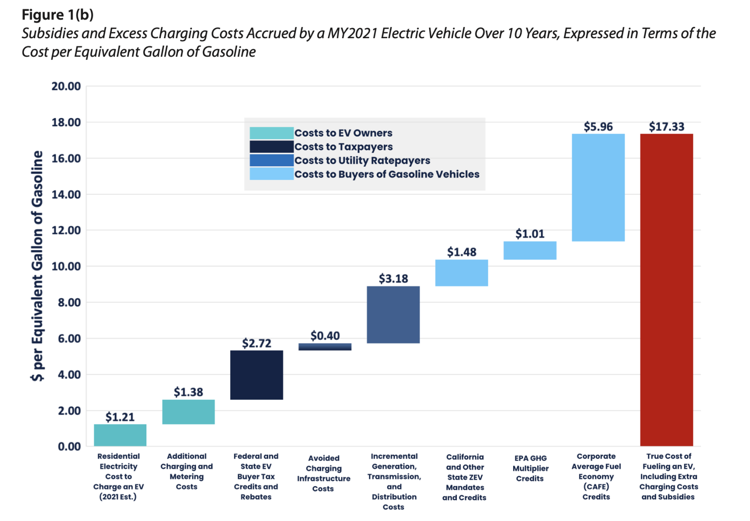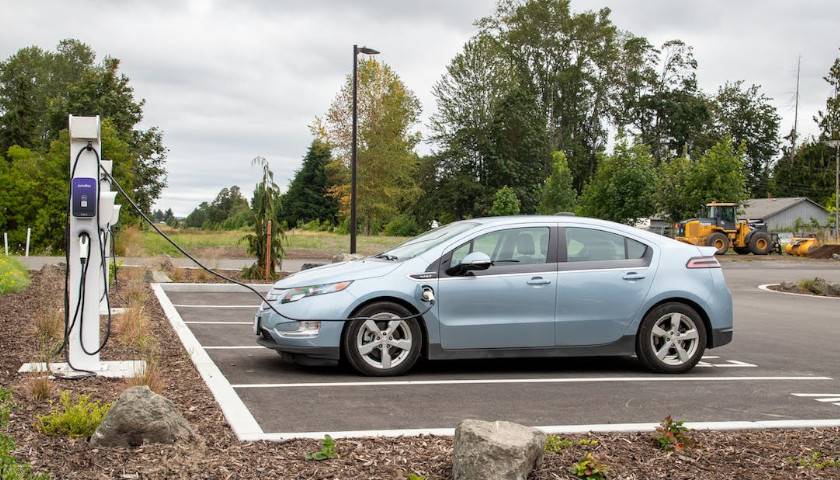by Kenneth Schrupp
The complete costs of “fueling” an electric vehicle for 10 years are $17.33 per equivalent gallon of gasoline, a new analysis from the Texas Public Policy Foundation says.
The study authors say the $1.21 cost-per-gallon equivalent of charging a car cited by EV advocates excludes the real costs born by taxpayers for subsidies, utility ratepayers for energy investments, and non-electric vehicle owners for mandate-and-environmental-credit-driven higher vehicle costs, which they say total $48,698 per EV. Those costs must be included when comparing fueling costs of EVs and traditional gas-powered vehicles, TPPF maintains.
“The market would be driving towards hybrids if not for this market manipulation from the federal government. We’d be reducing emissions and improving fuel economy at the same time on a much greater scale,” study author Jason Isaac told The Center Square in an interview. He then cited Toyota estimates that the batteries from one EV can power 90 hybrids and reduce emissions 37 times more than that one EV.
The study adds up the costs of direct subsidies to buyers of the car and chargers; indirect subsidies in the form of avoided fuel taxes and fees, as well as electric grid generation, transmission, distribution, and overhead costs for utilities; and regulatory mandates that include fuel economy standards, EPA greenhouse gas credits, and zero-emission mandates.

The study also assumes EVs will be driven for 10 years and 120,000 miles, which the authors claim is a generous estimate. According to J.D. Power, EVs lose 2.3% of their range each year due to battery degradation, in part driving EVs to lose value faster than internal combustion cars.
With Ford losing an estimated $70,000 per EV and subsidies reaching $50,000 per EV, Isaac says the real cost of a vehicle such as a Ford Lightning is over $150,000, and those costs are carried by everyone, including non-EV owners and even Americans without cars.
“The real cost of a Ford Lightning is closer to $172,00 and no one would buy them at that. I know their sales have tanked. The [electric] Silverado sold 18 electric trucks last quarter,” Isaac said. “Buying a car is more expensive today and people don’t understand why that is. I’m trying to help them understand if they buy a gas or diesel car they’re paying for an electric vehicle for a wealthy EV owner.”
To reach the $17.73 per gallon equivalent figure, the authors created categories for costs borne by EV owners, taxpayers, utility ratepayers, and buyers of electric vehicles. For reference, the cost per gallon equivalent is computed by dividing the number of miles over a car’s ten year lifetime by the average new vehicle’s fuel efficiency of 36 miles per gallon equivalent, and using that number to divide the total cost presented.
EV owners only pay $1.21 for the cost of residential electricity and $1.38 for charging and metering costs per equivalent gallon, which makes charging still cheaper than gasoline in terms of costs paid by EV owners. However, taxpayers pay $2.72 per gallon in federal and state EV buyer tax credits and rebates ($8,984 over a vehicle lifetime), a cost of $0.40 per gallon ($1,318 over a vehicle lifetime) in avoided charging infrastructure costs split between taxpayers and utility ratepayers. Utility ratepayers then pay $3.18 per gallon ($10,515 over a vehicle lifetime) in increased costs to enable the grid to charge electric vehicles at mass scale through increased power generation, transmission and distribution. Lastly, buyers of non-electric vehicles face increased vehicle costs equating to $1.48 per gallon equivalent ($4,881 over a vehicle lifetime) due to requirements in many states that manufacturers sell a certain number of often money-losing EVs to continue selling other cars, $1.01 per gallon equivalent ($3,322 over a vehicle lifetime) due to EPA GHG emissions standards, while Corporate Average Fuel Economy Credits add a whopping $5.96 per gallon equivalent ($19,678 over a vehicle lifetime).
CAFE standards are the single largest externalized cost of EVs, a cost that researchers attribute to the fact that automakers whose fleets do not meet the necessary average fuel economy must purchase credits from automakers with excess credits, with these credit markets worth billions of dollars per year and contributing $1.78 billion to Tesla’s bottom line in 2022. The average fuel economy of an average EV with a 300 mile range in 2021 was estimated to be 113 miles per gallon equivalent, making automakers strongly incentivized to build these often money-losing cars to meet CAFE goals. To increase the adoption of cars that don’t use diesel or gasoline, the federal government created a 667% multiplier in MPGe for vehicles that use alternative power. With a fleetwide CAFE standard of 37 MPG for 2021 and a 2021 EV rated at 113 MPGE, an EV is worth 507 MPG worth of credits, or more than what Ford loses directly on its EVs.
– – –
Kenneth Schrupp is the California reporter for The Center Square. His commentary and analysis have been published by Newsweek, RealClearPolitics, and the Pacific Research Institute.





